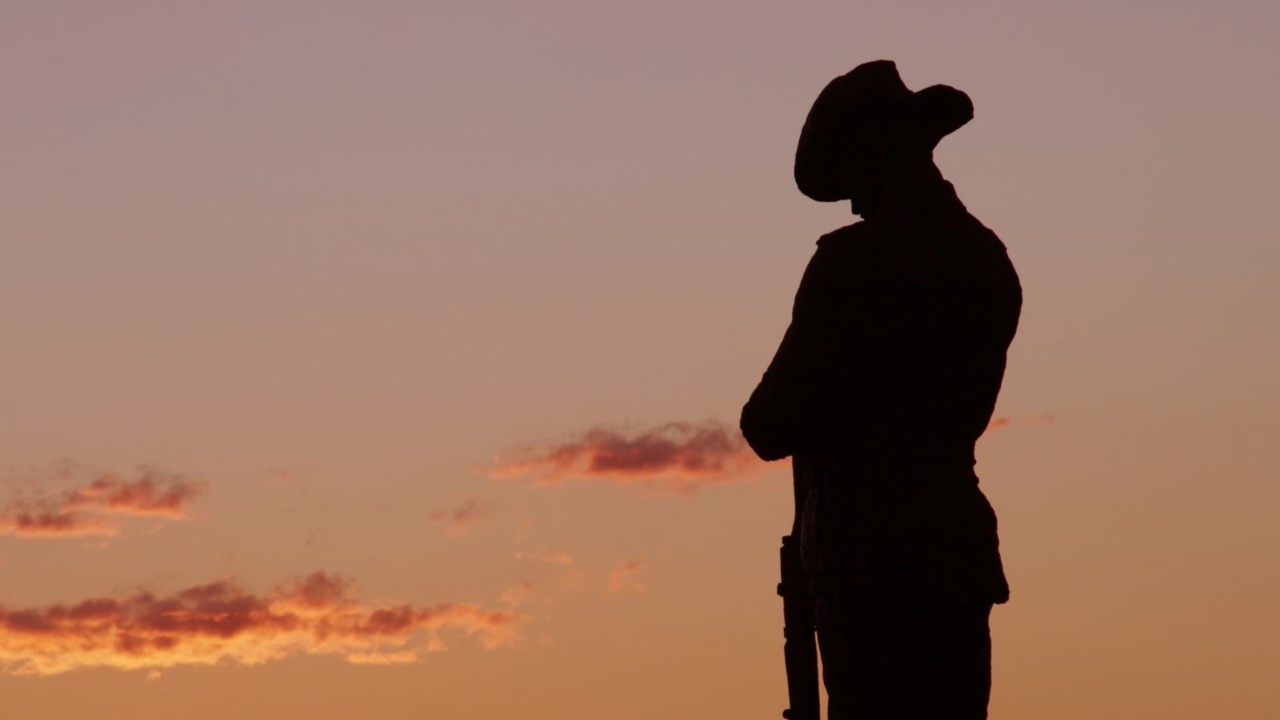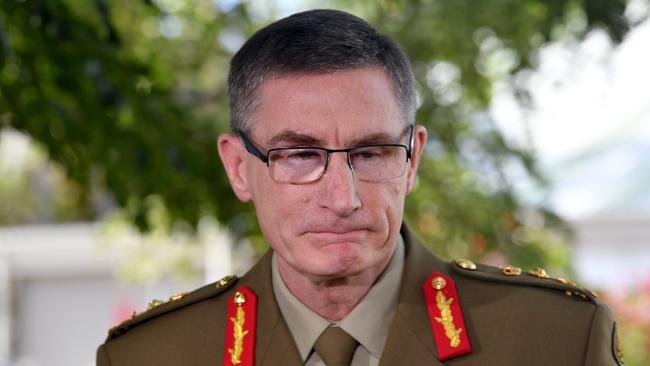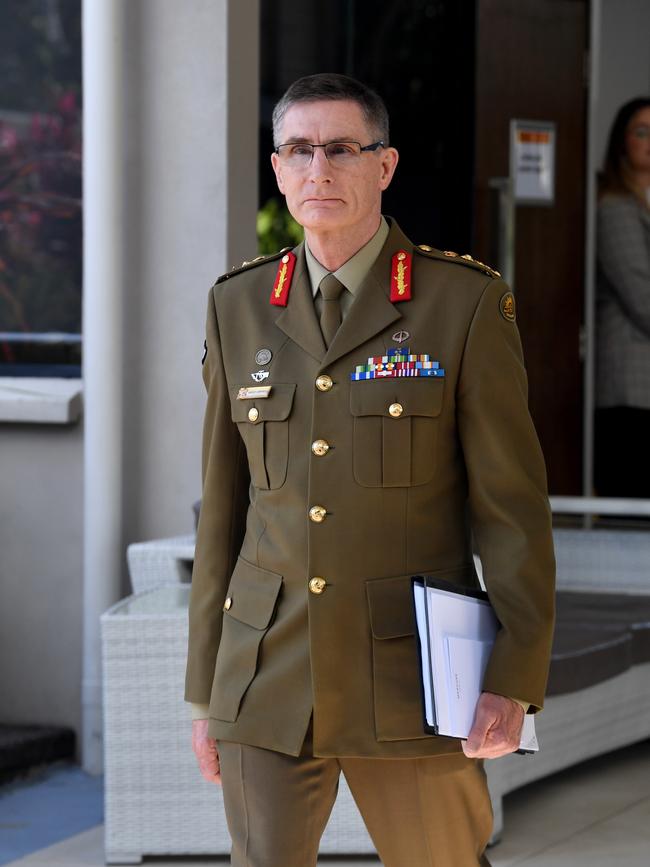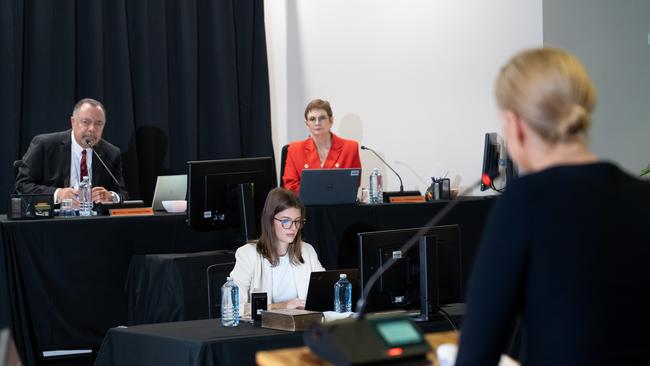Veterans shocked by latest Royal Commission twist
The ADF is set to launch a large public recruitment drive next month as all three forces continue to lose personnel at significant numbers.

News
Don't miss out on the headlines from News. Followed categories will be added to My News.
THE Australian Defence Force is set to launch a large public recruitment drive next month as all three forces continue to lose personnel at significant numbers.
Physical and psychological standards will be lowered in the current economic climate as Defence strives to meet the lofty 2040 target of the largest expansion of Australia’s military during peacetime to more than 101,000 personnel.
Evidence presented to the Royal Commission into Defence and Veteran Suicide shows large jumps in the number of soldiers, sailors and aviators discharging from the ADF with Army’s separation rate jumping from 10.9 per cent to 13 per cent of staff in just a year.
In the 12 months to May 2022 Army lost 13 per cent of its workforce while Navy and Air Force lost 9.3 per cent and 8.7 per cent respectively.
Chief of the Defence Force Angus Campbell told the commission all three services experienced concerning and “serious” increases in the number of people leaving and said the ADF effectively replaced half of its workforce every seven years.

In his written statement to the commission General Campbell said that Defence’s recruitment “risk appetite” had increased due to the current economic circumstances and low unemployment rate.
His statement noted fitness standards had “slightly reduced” while the ADF was prepared to consider candidates who posed a higher psychological risk for certain roles.
Responding to a question from counsel assisting Peter Gray, General Campbell said increasing separation rates had led to changes in selection requirements.
For example, a person who arrives with low aerobic fitness might be given a waiver to join without meeting the standard with the requirement they reach the required fitness level during training.
Evidence presented to the commission shows that since January 2011 the ADF lost more than 7000 personnel who served less than a year.
In that time, Defence lost 859 people in less than a year because they were deemed “unsuitable for service” while 1211 were kicked out because their retention was “not in service interest”.
Mr Grey asked the General if these numbers reflected a systemic problem with Defence’s recruitment processes or standards.
“How is it that there are so many people recruited to the ADF who are so often, and in such a short time, found to be unsuitable for service,” he said.

General Campbell described the ADF’s recruitment process as “fallible” and said he and other top brass had formed a new recruitment and retention team in April in response to high separation numbers with the goal to keep people in service for between seven to 10 years.
Mr Gray questioned the general about the changes to eligibility criteria, specifically the changes to psychological standards.
“Doesn’t this doesn’t this have the potential to create adverse outcomes, and possibly a vicious cycle where more and more people will be recruited who are unsuitable and then discharged early, adding to the churn problem the ADF is facing,” he asked.
General Campbell brushed off concerns about changes to psychological standards and said it meant the ADF were prepared to consider candidates, in some circumstances where the risk was marginally different.
Defence will launch its recruitment media campaign in July to address what it’s called “misaligned” views about if the ADF offers well-paid jobs with good work-life balance.
Market research undertaken by Defence found jobs within the ADF are perceived as challenging, dangerous and high pressure.
The research also shows that the young people Defence is seeking to recruit are looking for jobs that pay well and have a good work-life balance.
‘Do the right thing’: Commission chair urges government to act
SERVING members of the Australian Defence Force and veterans are not protected from disciplinary action for their evidence to the Royal Commission into Defence and Veteran Suicide.
The commission, which is holding hearings in Townsville, was told there is no formal arrangement to protect witnesses from liability if their evidence discloses any potentially protected Defence information, despite a request to the Commonwealth to make a plan months ago.
Commission Chair Nick Kaldas raised the issue prior to evidence restarting on Friday and called for the government to “do the right thing”.
“It is now coming up to nine months,” he said.

“You can see how a cynical mind would think that there has been tardiness on the part of the Commonwealth.”
The revelation came as a shock to some veterans who told the Bulletin they believed all evidence provided to the commission was protected.
Mr Kaldas said the commissioners wanted to ensure that appropriate arrangements were in place to ensure witnesses faced no risk of liability under any legislation for sharing their stories.
“This is a very important issue for the Royal Commission … and we want to ensure every protection is given to those who come forward with information,” Mr Kaldas said.
“We were not proposing to elicit any protected information or even sensitive operational information.
“We simply wanted an unambiguous green light given to serving and former serving members to provide appropriate and textual information … relating to their experiences … without fear that by doing so they could … get into trouble.”
He said the commission approached the Commonwealth in October last year with a proposal on how to achieve adequate protections for witnesses but that the response was delayed.
Commonwealth lawyer Stephen Free said his client shared the Royal Commission’s concerns but said blanket immunity for a group of people was “legally and practically complex”.
“It is simply not possible, within the existing legislation for any member of the commonwealth executive to grant a blanket immunity,” he said.
“No one within the commonwealth has the authority to grant that and if they purported to do it, it is not something that would be legally effective.”
Chief of the Defence Force General Angus Campbell returned to the witness box on Friday where he was asked about offering this protection.
“Their story can be told without necessarily expressing issues such as questions of mission or operational circumstance,” he said.
Interesting to note the @roycommDVSRC commissioners are not looking for classified info but want an "unambiguous green light" for witnesses to give textual information about their experiences without fear they will get into trouble. #dvsrc#adf#miltwitter
— Ashley Pillhofer (@ashpillhofer) June 24, 2022
“Surely the story that is being told is a story about human interaction and that is irrespective of location, mission, circumstance, security classification.
“(It) does not require a conversation about tactics, operational circumstances, mission and so forth.”
Mr Kaldas pushed the point at the conclusion of General Campbell’s evidence and urged him to help resolve the issue which the Defence played a critical role in.
General Campbell said he strongly encouraged people to come forward to the commission.
“Be assured … there will be no consequences whatsoever and any supervisor who might think that will be held to account,” he said.
The General did not specify if his final comment to the commission included protection from legal consequences as well as disciplinary.
More Coverage
Originally published as Veterans shocked by latest Royal Commission twist




